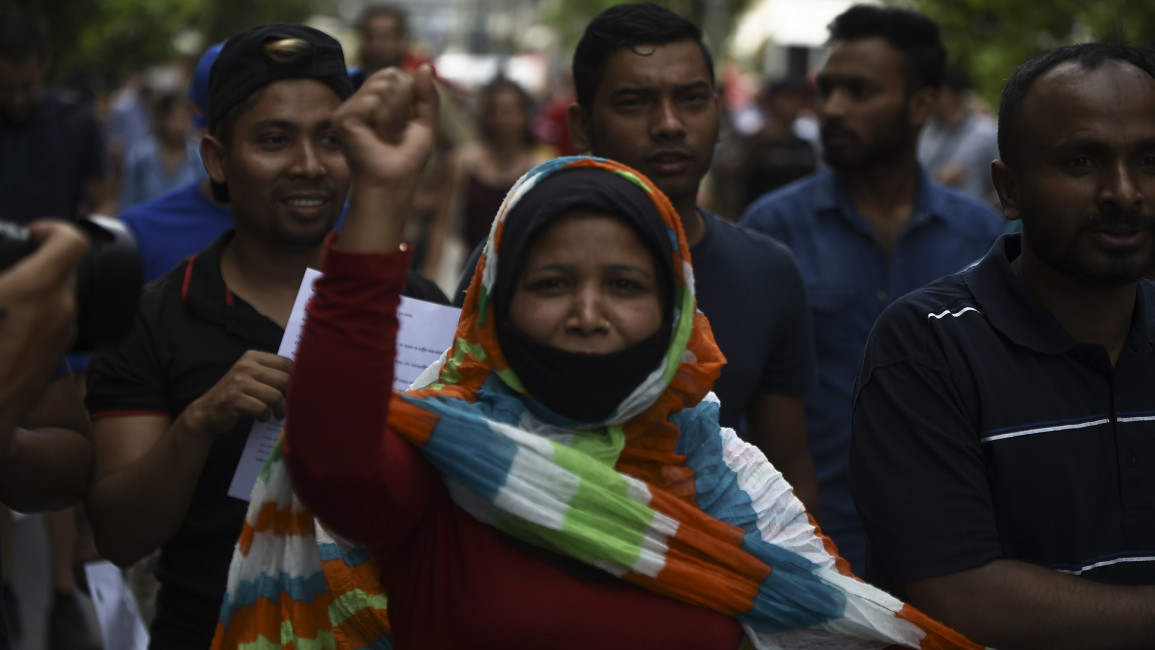Greece announces extension of coronavirus lockdown in overcrowded refugee camps amid growing concern over conditions
Greece announced on Saturday another extension of the coronavirus lockdown in its heavily overcrowded refugee camps, hours after some 2,000 people protested in central Athens to mark World Refugee Day and denounce the government’s treatment of migrants.
The migration ministry said confinement for residents of reception and identification centres across the country would be extended to July 5. It was due to have ended on Monday.
Greece was quick to introduce strict confinement measures on refugee camps on March 21 and imposed a more general lockdown on March 23.
While no known coronavirus deaths have been recorded in the camps so far and only a few dozen infections have surfaced, the measures have since been extended a number of times.
Rights groups have expressed concern that refugees' rights have been eroded by the restrictions.
Most of the refugees come from war-torn countries in the Middle East, Central Asia, and Africa, such as Syria, Iraq, Afghanistan, and the Democratic Republic of Congo.
Read more: No one should be left to die - Fighting to protect refugees in Europe amid Covid-19
Earlier on Saturday, members of anti-racist groups, joined by refugees from migrant camps, marched in central Athens, holding banners proclaiming "No refugee homeless, persecuted, jailed" and chanting slogans against evictions of refugees from temporary accommodation in apartments.
Thousands face homelessness as Greek authorities plan to move more than 11,000 people to make room for other asylum seekers currently living in dismal island camps.
|
|
On Saturday, the Greek government also announced that it was restricting the work of NGO charities in the camps, for transparency reasons.
Refugees used to be able to keep their accommodation for up to six months after receiving protected status.
The new conservative government of Prime Minister Kyriakos Mitsotakis has reduced this to just a month.
The government insists that it is doing everything necessary "to assure a smooth transition for those who leave their lodgings".
The United Nations High Commissioner for Refugees (UNHCR) has voiced concern, stressing that many of the refugees do not have effective access to social benefits and support.
'Disproportionate burden'
In a message for World Refugee Day, the Ministry for Migration and Asylum said Greece has found itself "at the centre of the migration crisis bearing a disproportionate burden".
"The country is safeguarding the rights of those who are really persecuted and operates as a shield of solidarity in the eastern Mediterranean," it added.
Government officials have repeatedly said Greece must become a less attractive destination for refugees.
The continued presence of more than 32,000 refugees on the islands - over five times the intended capacity of shelters there - has caused major friction with local communities who are demanding their immediate removal.
An operation in February to build new camps on the islands of Lesbos and Chios had to be abandoned due to violent protests.
Rights groups have repeatedly criticised unhygienic and unsafe living conditions in existing camps.
Greece is also accused of illegal pushbacks by its forces at its sea and land borders, which according to reports had increased since March.
Athens has repeatedly denied using illegal tactics to guard its borders, and has in turn accused Turkey of sending patrol boats to escort migrant boats into its waters.
The UNHCR said that although around 3,000 asylum seekers arrived in Greece by land and sea since the start of March, the figure was much lower than over previous months.
Follow us on Facebook, Twitter and Instagram to stay connected



